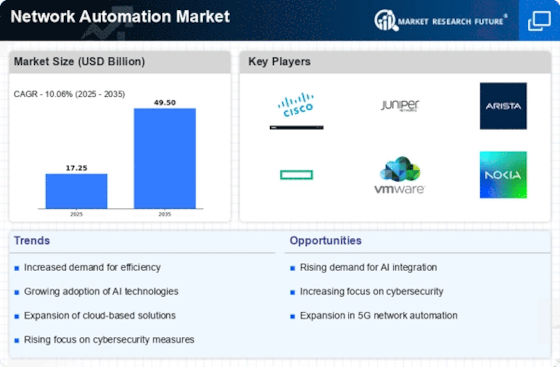Top Industry Leaders in the Network Automation Market

Competitive Landscape of Network Automation Market:
The network automation market is witnessing intense competition as organizations strive to enhance operational efficiency and agility through the automation of their networking processes. Key players are implementing diverse strategies to secure a significant share in this dynamic market.
Key Players:
- Cisco Systems Inc. (U.S.)
- Juniper Networks Inc. (U.S.
- IBM Corporation (U.S.)
- Micro Focus International plc (U.K)
- NetBrain Technologies Inc. (U.S.)
- SolarWinds Inc. (U.S.)
- Riverbed Technology Inc. (U.S.)
- BMC Software (U.S.)
- Apstra (U.S.)
- BlueCat (Canada)
Strategies Adopted:
-
Partnerships and Collaborations: Major players are forming strategic alliances with technology partners and industry leaders to leverage synergies and expand their offerings. These collaborations enable the development of integrated solutions that address the complex networking requirements of modern enterprises.
-
Product Innovation: Continuous innovation remains a cornerstone of competition in the network automation market. Companies are investing heavily in research and development to introduce cutting-edge automation tools and platforms that cater to the evolving needs of businesses.
-
Acquisitions: Inorganic growth through acquisitions is a prevalent strategy among key players. By acquiring niche technology providers or startups, companies aim to augment their portfolio, accelerate time-to-market, and strengthen their competitive position.
-
Global Expansion: Market leaders are aggressively expanding their presence in key geographical regions. This expansion includes establishing regional offices, data centers, and strategic partnerships with local players to better serve the diverse needs of global clients.
Factors for Market Share Analysis:
-
Technology Compatibility: The ability of network automation solutions to seamlessly integrate with existing infrastructure and support diverse technology stacks significantly influences market share. Solutions that offer interoperability and ease of integration gain a competitive edge.
-
Scalability and Flexibility: Scalability is a critical factor for enterprises with varying network sizes and complexities. Solutions that can adapt to the dynamic nature of networks and accommodate growth without compromising performance are favored in the market.
-
Security Features: As cybersecurity threats continue to evolve, network automation solutions with robust security features are in high demand. Companies that prioritize and effectively address security concerns enhance their market share.
-
Customer Support and Service Quality: Quality customer support and service play a pivotal role in customer retention and acquisition. Companies offering responsive support, regular updates, and training programs gain a competitive advantage in the market.
New and Emerging Companies:
-
Startups Focused on Niche Solutions: A wave of startups is entering the network automation space, offering specialized solutions for specific industry verticals or unique networking challenges. These nimble players often bring fresh perspectives and innovation to the market.
-
Cloud-Native Automation Providers: With the increasing adoption of cloud infrastructure, companies specializing in cloud-native network automation solutions are gaining traction. These providers offer scalability and flexibility to meet the demands of cloud-centric enterprises.
-
AI-Driven Automation Companies: Leveraging artificial intelligence (AI) for intelligent automation is a growing trend. Companies employing AI algorithms for predictive analytics, anomaly detection, and self-healing capabilities are emerging as key players in the market.
Current Company Investment Trends:
-
R&D Investments: Established companies are allocating substantial resources to research and development, aiming to stay ahead of the technological curve. Investments in R&D fuel the continuous improvement of existing solutions and the development of innovative features.
-
Partnership and Ecosystem Development: Many companies are investing in building robust partner ecosystems. These ecosystems often include technology integrations, third-party app marketplaces, and developer communities to create a comprehensive network automation ecosystem.
-
Talent Acquisition and Training: Recognizing the shortage of skilled professionals in the field of network automation, companies are investing in talent acquisition and training programs. This ensures that their customer base has access to knowledgeable and skilled resources for effective implementation and support.
-
Customer Experience Enhancement: Improving the overall customer experience is a priority for companies looking to differentiate themselves. Investments in user-friendly interfaces, comprehensive documentation, and customer education initiatives contribute to enhancing customer satisfaction and loyalty.
Latest Company Updates:
Gluware launches a reseller partner programme in 2023 that focuses on network automation opportunities. "The programme they currently have in place and the work they're doing with partners will significantly improve our services capabilities." [Gluware] recognises the value of partners and comprehends the partner ecosystem. An official from Gluware partner Advizex tells CRN that "not many [vendors] bring partners into deals anymore."
Leading provider of intelligent network automation, Gluware, 2023, today announced the release of Gluware 5.1, a no-code application package and platform that helps businesses foster hyperautomation and enable self-operating networks.
Gluware 5.1 offers expanded support for Check Point Gaia, Extreme Networks ExtremeXOS, Palo Alto PAN-OS, Fortinet FortiOS, and more, along with new and improved pre-built features for Cisco ACI, Cisco Meraki, and Versa Networks. App support for Device Manager, Config Drift, and Audit is made possible by the new API modelling support for Cisco ACI.
METRO Inc. establishes a new automated fresh and frozen product distribution hub in Terrebonne in 2023. This brand-new, cutting-edge infrastructure is the outcome of a significant investment programme that amounted to almost $1 billion. The program's goal was to modernise METRO's distribution network in Quebec and Ontario in order to better serve its customers and merchant and chemist owners both now and in the future.










